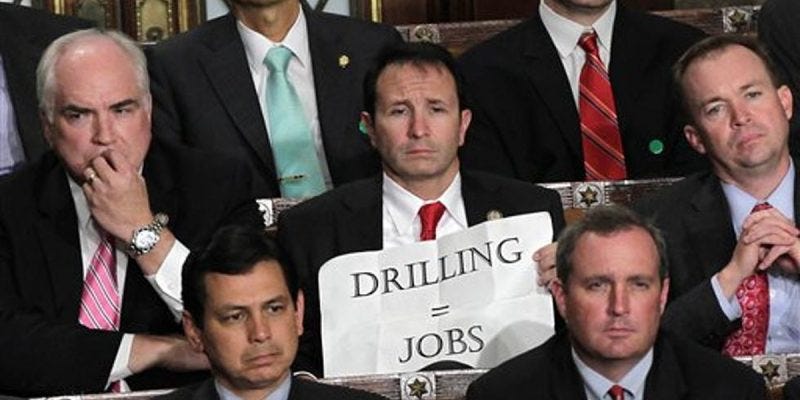2023 Elections: The Final Stretch, Part One
Virginia, Louisiana, and Mississippi
2023 has been an unsettling year in electoral politics. Congressional dysfunction is getting even worse just as the need to respond to climate disasters is becoming more urgent. The public is bracing themselves for a rematch of the last presidential election, with seemingly few voters excited about the prospects that 2024 will bring needed changes.
The entire Democratic Party apparatus is facing a crisis of organizational capacity, as advocacy and electoral organizations old and new face internal strife and funding constraints.
Republicans continue their march toward ecofascism: choosing a theocratic insurrectionist as House Speaker; escalating their anti-immigrant demagoguery and exploiting global conflicts to call for fossil fuel expansion; attacking free expression in Tennessee; working with oil tycoons to exonerate corrupt Texas Attorney General Ken Paxton; and taking drastic measures to pass extreme gerrymanders in the swing states of North Carolina and (potentially) Wisconsin.
In spite of it all, Democrats and progressives have managed some big successes at the ballot box this year, defeating an undemocratic ballot measure in Ohio; outperforming in special elections, including for a Republican-leaning New Hampshire House seat; and pulling off victories in the Chicago and Nashville mayoral elections, as well as in a big primary in Pittsburgh. Entering the final stretch of 2023, we take a look at the climate implications of the year’s remaining elections, most of which will take place on November 7.
In this post, we look at elections in three states of the former Confederacy: Virginia, Louisiana, and Mississippi.
Virginia
Both of Virginia’s legislative chambers are in play in this fall’s elections, and things look very tight. Democrats hold a narrow (22-17) majority in the state Senate, while Republicans hold a slim (51-46) majority in the House of Delegates. Early voting numbers and fundraising figures show a close contest between the two parties—especially since governor Glenn Youngkin (R) has spent heavily from his fossil-fuel finance fortune to secure a trifecta during his final two years in office. Most of the state legislative campaigns have focused on Youngkin’s stated aim of enacting a 15-week abortion ban. But with a governing trifecta, Youngkin would also get the chance to finish dismantling the climate progress made under his predecessor. The Virginia League of Conservation Voters is spending millions to counter Youngkin’s efforts.
The six most competitive Senate races are in districts 16 (Western Henrico County), 17 (Suffolk), 24 (Newport News), 27 (Fredericksburg), 30 (Manassas), and 31 (North and West Loudon County). Most of these districts are ones that Democrats have carried at the top of the ballot, and four of them feature open seats. The races with incumbents are SD 16, where Republican Sen. Siobhan Dunnvant has been called the “Susan Collins of Virginia” presumably by people who think that is a compliment, and the swingy SD 24, which is currently held by Democratic Sen. Monty Mason. For his work expanding offshore wind, Mason was endorsed by Climate Cabinet. Dems will need to win three of these six competitive races to hold their majority, while Republicans need to pick up at least four of the six in order to hold a 20-20 majority with Republican lieutenant governor Winsome Sears breaking ties.
The party that wins six of the most competitive 10 races will likely secure a majority in the House of Delegates. All ten of these elections are taking place in the suburban NoVA, Richmond, and Virginia Beach communities that swung mostly strongly toward Republicans in 2021— each district was won by Biden, but seven of them were then carried by Youngkin. The most dramatic example is HD 21 in the D.C. suburbs around Gainesville, which Youngkin carried by nearly two points after Biden had won it by a whopping 26% only one year prior. In HD 21, Lead Locally is backing Joshua Thomas, a Marine veteran and Democrat, against Republican John Stirrup, a former Prince William County supervisor.
Another competitive race is the Fredericksburg-based HD 65, where Lead Locally has endorsed former Del. Joshua Cole, a strong ally in the opposition to the Mountain Valley Pipeline.
Louisiana
Louisiana, literally losing itself to rising seas, fossil-fueled storms, and the cancerous petrochemical industry, held its “jungle primary” on October 14. There had been some speculation that Republican infighting in a crowded field would enable Democrats to win their third consecutive gubernatorial election. Instead, Democrats failed to make the runoff, as Attorney General Jeff Landry clinched the governorship by securing a 52% majority. The Democratic candidate, former state transportation secretary Shawn Wilson, finished second with about 26% of the vote.
Landry has been a leader of the strategy to achieve “early victories against the Biden administration’s climate agenda” by “forum shopping” and challenging climate rules in the right-wing Fifth Circuit Court of Appeals. His ugly campaigns for unfettered police power in Louisiana’s majority black cities have disturbing Jim Crow undertones. Last year, Landry used his position on the state bond commission to block flood protection resources as retribution against New Orleans Mayor LaToya Cantrell’s support for abortion rights.1 Even some state Republicans have objected to Landry’s tactics, as when Treasurer John Schroder criticized Landry “playing politics” with the bond commission— an odd critique from Schroder, who chairs the driving force behind a strategy to use state pension funds to conduct a costly culture war against socially responsible investing. Landry easily defeated all of his Republican opponents despite substantial attempts to stop him, including an ad by Schroder tying Landry to a figure behind the “largest insurance fraud in Louisiana history.”2
Three statewide races are going to a November 18 runoff. The most competitive is likely to be the open treasurer’s race, where former Republican Congressman John Fleming won 44% of the vote and Democrat Dustin Granger came in second with 32%. Granger was the top statewide Democratic vote-getter, winning nearly 46,000 votes more than Wilson. He launched his campaign with a frontal attack on Schroder’s management of state resources to entrench fossil fuel interests and amplify climate risks, and criticized Louisiana politicians’ “unwavering allegiance to Big Oil.” He has called for Louisiana to diversify its investment portfolio.
Fleming, a former Trump administration official, lobbyist, and House Freedom Caucus co-founder, has admitted that he plans to use the treasurer’s office as a stepping stone for higher office. He has pledged to continue Schroder’s work restricting responsible investing at the behest of the fossil fuel industry, which has given him $867,050 over the course of his career. This includes sizable contributions to his treasurer campaign from ConocoPhillips ($9,000), Chevron ($8,000), ExxonMobil ($6,500), and more. Fleming did a lot of blocking and obstructing during eight years in Congress, as when he introduced legislation to block disclosure of chemicals used in fracking, helped shield BP executives from congressional subpoenas following the DeepWaterHorizon spill, and opposed disaster relief following Superstorm Sandy.
In the race to succeed Landry as AG, Republican Liz Murril, who took 45% of the vote in the first round, will face Democrat Lindsey Cheek, who won about 23%. There will also be a runoff in the Secretary of State race, where Republican Nancy Landry (no relation to Jeff) will face Democrat Gwen Collins-Greenup. Landry and Collins-Greenup each drew about 19% of the first-round vote, but Landry has the easier task in consolidating the 68% of the vote that went to other Republican candidates.
In Cancer Alley, Lead Locally is backing Joy Banner for Parish Council in St. John the Baptist Parish.
Mississippi
Like neighboring Louisiana, Mississippi has a strong Republican tilt, Big Oil lobbying ties, pending litigation over whether its congressional maps wrongly dilute Black voter strength, and a vulnerable insurance market. Unlike Louisiana, Mississippi is hosting a competitive gubernatorial election this fall. Incumbent Republican governor Tate Reeves faces low approval ratings in the wake of a truly outrageous scandal involving diversion of anti-poverty program dollars to help former NFL star Brett Favre build a volleyball facility. Reeves’s opponent is Public Service Commissioner Brandon Presley, a conservative Democrat whose record as a utility regulator includes steps to (very) gradually expand clean energy and to protect ratepayers from an “unproven” multibillion-dollar greenwashing proposal at a gas plant. There are also elections for other statewide offices, including insurance commissioner, though Republicans are heavy favorites in all of them.
In our next post, we will look at Maine, Kentucky, and municipal elections across the nation.
Contrasting his approach to Louisiana’s powerful executive branch with outgoing Democratic governor John Bel Edwards, Landry promised on Fox News that he would “bend [New Orleans] to his will.”
Insurance has been an issue in this campaign, since fossil fuel pollution has led to dysfunction in Louisiana’s insurance markets. State politicians considered and approved several interventions during the 2023 legislative session, but by stripping the insurance commissioner of some of its power to regulate rates, they may have made the position less appealing. Republican Tim Temple won an uncontested race for the office. In a state where insurance is becoming ever less affordable and accessible, Temple’s stated plans include weakening consumer protection laws, making it harder to sue insurers, and allowing for more regular rate increases. He has compared coverage requirements to socialism and did not commit to supporting more funding for the state’s roof fortification program.







